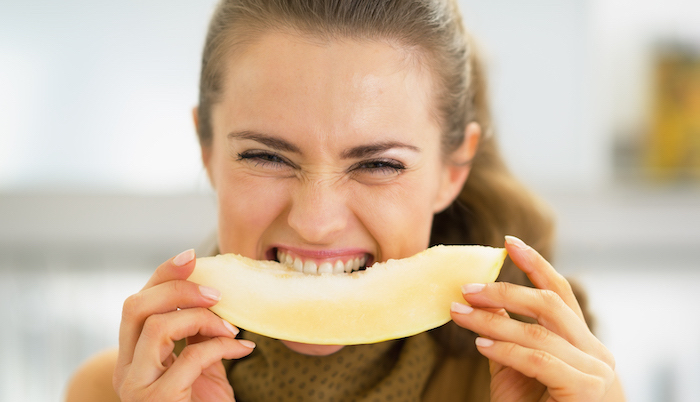“Well chewed is halb digested …”
… a common saying that reminds us not to gulp down our food, but to chew it thoroughly. And at first glance, it sounds simple enough to regularly chew thoroughly – after all, it can be done easily by just about anyone, anywhere. Unfortunately, actually putting this into practice would say otherwise.
Most of us are used to eating quickly and swallowing after a few chewing motions. And it quickly becomes clear that trying to abruptly quit this habit, which we’ve have been practicing for years, is quite a feat.
Nevertheless, in this article we want to encourage you to try practicing this again and again, because “thorough chewing” promises a whole new dimension of health, pleasure, and time.
CONTENTS
The Advantages of Thorough Chewing
- It Stimulates the Flow of Saliva
- Thorough Chewing Relieves Digestion
- Thorough Chewing Improves Nutrient Absorption and Vitality
- Thorough Chewing Stimulates and Supports the Immune System
- Thorough Chewing Strengthens the Chewing Muscles
- Thorough Chewing Improves Taste Perception
- Thorough Chewing Helps Weight Loss
- Thorough Chewing Makes You More Attentive and Satisfied
Practical Instruction
Let’s Consider the Benefits:
It Stimulates the Flow of Saliva
In the mouth, the jaws, tongue, and especially the teeth are responsible for sufficiently grinding up food. This process is significantly supported by saliva, which truly deserves the name “healing elixir.”
The saliva
- is rich in enzymes and initiates the digestion of carbohydrates in the mouth.
- contains antibacterial substances like lysozyme, immunoglobulin A, and histatin.
- is slightly alkaline and neutralizes the pH value in the mouth.
- is an important flavor carrier, because only when the flavor substances have dissolved in our saliva can they reach the taste buds of the tongue and trigger a signal there.
Thorough chewing gives the salivary glands time to produce plenty of enzyme-rich saliva. Salivating the food is very important for the digestion that follows in the gastrointestinal tract. If food is eaten too quickly and chewed only a little, this important first digestive step is missing and can result in digestive disorders, flatulence, or an uncomfortable feeling of fullness.
Thorough Chewing Relieves Digestion
A healthy and nutritious meal can miss its mark if it’s not chewed very well. Breaking down poorly chewed food requires a lot of work from the stomach and intestines and can lead to putrefaction and fermentation while it’s still in your system. Bloating, flatulence, heartburn, fatigue, or even allergies are all possible consequences.
Sufficiently chopped and salivated food, on the other hand, is a blessing for the digestive system, because then the digestive forces in the stomach can devote themselves entirely to their main task of protein digestion while also getting rid of unwanted bacteria.
These are ideal conditions for the processing that takes place in the small intestine – the pre-digested, enzyme-rich food pulp that arrives can now be broken down further into smaller parts with the support of the pancreatic and bile juices until they can be absorbed by the blood.
Thorough Chewing Improves Nutrient Absorption and Vitality
During normal chewing, we lose a lot of vital substances and nutrients, because the digestive tract can’t succeed in completely breaking down food while it’s expending so much energy. On the other hand, nutrients can be optimally absorbed from a well-digested food pulp, making them more easily available to the cells.
So even with a small amount of food, more nutrients can be available to us, we’re well nourished, and even after some time has passed we still feel satiated.
Thorough Chewing Stimulates and Supports the Immune System
The antibacterial effect of saliva supports the body’s immune system in several ways:
- Saliva promotes the bacterial balance of the oral flora and helps in disinfecting and in preventing cavities.
- Saliva has an important guardian function and renders viruses, bacteria, and other pathogens harmless once they reach the mouth, which protects the entire immune system against invaders.
- A healthy stomach has enough acidic gastric juice to disinfect the food and eliminate pathogens that have managed to penetrate up to that point.
Thorough Chewing Strengthens the Chewing Muscles
Chewing for longer stints massages the gums, increases blood circulation in the jaw area, strengthens the chewing muscles, and activates the auditory system. But be careful: If you’re not used to this strain, then expect to have sore muscles around the jaw at first.
Thorough Chewing Improves Taste Perception
What initially requires a lot of discipline can soon prove to be a huge benefit: Conscious chewing makes it possible to taste subtle nuances of flavor and to gain a completely new perception of taste with a greater sense of pleasure.
Only during thorough chewing does the true taste of food really start to unfold, making it clear whether something actually tastes good or if it tastes empty. This can even mean that familiar foods no longer taste as good once they’ve been chewed properly, and that a change in diet may be in the offing.
Most products available in the supermarket are designed to spark a flavor explosion in the first few bites, but then quickly start to taste bland afterwards.
Thorough Chewing Helps Weight Loss
It turns out that good chewing can be quite an effective alternative to various diets.
People who eat too quickly have already overeaten by the time they actually start to feel full. But those who chew thoroughly automatically take longer for their meal, feel full with smaller amounts, and more satisfied overall because their nutrient absorption has also improved – and quite incidentally the pounds start tumbling off.
Are you interessted in gaining a comprehensive understanding of the health benefits of a plant-based diet? Download the curriculum for our Holistic Nutrition Coach training program.
Thorough Chewing Makes You More Attentive and Satisfied
Chewing thoroughly causes you to pay more attention to the whole meal. The stomach is able to receive a pre-digested pulp, which allows a greater sense of well-being, satisfaction, and a feeling of “being nourished” to set in.
And anyone who consciously practices it will notice and suspect that conscious chewing has a huge potential in itself and can be a catalyst for other health aspects, such as:
- Slowing down the speed of everyday life
- A change in diet
- Focusing on the present moment and becoming more mindful and relaxed
- Recognizing annoying habits
- Perhaps even the motivation to realign life as a whole

Now it’s time for some implementation:
Practical Instruction
Anyone can learn to chew thoroughly, but like many things in life, it takes practice. Hardly anyone is successful on the first try.
Don’t be frustrated when you realize, after chewing for the 10th time, that your mind is already somewhere else and the food has already left your mouth. Just be proud that you’re doing it at all, and have faith that your senses will become more and more sensitive to conscious eating and that you’ll gradually get used to chewing more and more thoroughly.
Mindful Environment
Your daily eating space is incredibly important. Create an environment that promotes mindful eating, a dining place where there are no distractions like newspapers, cell phones, etc., and where you feel very comfortable.
The Thorough Chewing
Denser foods like a piece of bread, an apple, or a carrot are especially good for practice..
- Take a bite and start chewing as soon as the saliva flows.
- Resist the first swallowing reflexes, which make you swallow the bite at the first moment you lose focus.
- Now you have to chew the bite little by little until it’s completely liquified. Depending on what kind of food it is, this takes different amounts of time.
- It’s not necessarily a matter of the number of chewing motions, but rather that the food is really liquid before you swallow.
Try to focus taste perception on the liquid part of the food.
- After about 10-20 chewing motions, swallow a little of the liquid portion and continue chewing the rest until the entire bite is liquified. Only when you’ve completely tasted it, and there are no more pieces in it, is it ready for the stomach.
- Counting the chewing movements can be helpful at the beginning, but the concentration is on liquefying the food.
You can trick the swallowing reflex by sucking the bite a little bit and swallowing its liquid.
If you swallow too soon, the body has to make up for this digestive step in the small intestine. In this way, however, the enzymes can divide the long chains of carbohydrates into shorter ones while they’re still in the mouth. The food pulp becomes sweeter in the process.
Goal:
To chew salads, vegetables, nuts, etc. to the consistency of pulp and to salivate soups, smoothies, and purees extensively.
_________________ ♡ _____________________
Would you like to join our unique, based on nutritional sciences and practice-oriented training program for gaining a high level of health?
We are more than happy to inform you about our training program on our website!





0 Comments